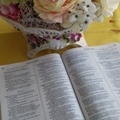[A devotional reflection originally prepared for the congregation of Horley Baptist Church during July 2024]
Open my eyes that I may see wonderful things in your law.
Psalm 119 v18 [NIVUK]
When, last year, the then Polish government took some actions that were contrary to the expectations of the European Commission the Poles were accused of defying the ‘rule of law’. Whose law were they breaking? Surely, as an independent sovereign state, they were entitled to make their own laws. What is ‘the rule of law’ anyway?
The rule of law is a long-established principle that no member of a society is above or exempted from the laws of that society. Examples of situations contrary to the rule of law would include the divine right of kings, presumptive politicians, duplicitous dictators or a prejudiced judiciary.
The principle predates the Ten Commandments and other laws that were given to the people of Israel after their escape from Egypt but God invoked a similar principle when defining his expectations of them:
The community is to have the same rules for you and for the foreigner residing among you; this is a lasting ordinance for the generations to come. You and the foreigner shall be the same before the Lord: the same laws and regulations will apply both to you and to the foreigner residing among you.
Numbers 15 v15-16 [NIVUK]
The apostle Paul set out his own attitude to the governing authorities in several of his letters, perhaps most notably in Romans chapter 13:
Let everyone be subject to the governing authorities, for there is no authority except that which God has established. The authorities that exist have been established by God.
Romans 13 v1 [NIVUK]
This is an interesting stance to take, especially in the context of Paul’s own interactions with the governing authorities.
But what about when the law itself is wrong? In the early days of the Christian community, Peter and some other apostles upset the religious authorities by preaching about Christ’s death and resurrection. They were instructed to stop preaching but Peter and the other apostles replied: “We must obey God rather than human beings!”[1] Are there times when we find it convenient to hide behind the law rather than speak out?
Just as the rule of law applies all the members of a society so the rule of sin dominates humanity. Well-drafted human laws will include provisions both for the punishment of offenders and for exoneration in particular circumstances. Exoneration in the context of God’s laws requires a blood sacrifice; for us that sacrifice was the death of Jesus Christ at Calvary. Does this once-for-all sacrifice mean that we can carry on as we wish, just remembering to clock-in with a bit of repentance every now and then? Paul had some words about that too:
What shall we say, then? Shall we go on sinning so that grace may increase? By no means! We are those who have died to sin; how can we live in it any longer?
Romans 6 v1-2 [NIVUK]
References:
[1] Acts 5 v29 [NIVUK]
Bible quotations: Unless otherwise specified, quotations are taken from the resources of Bible Gateway or Bible Hub, in accordance with the licencing conditions outlined on our Site Policies page.
Bible dates:
Where appropriate, the dates given for Biblical events are based on the Bible Timeline resource
and are subject to the constraints defined on the corresponding webpage.
 Horley Baptist Church online
Horley Baptist Church onlineHBC main site
Confidential prayer link
Link to Recent Reflections
Link to Index of Bible Passages
Last week’s reflection: Honouring the GodFather
Contributed by Steve Humphreys; © Steve Humphreys

Thank you Steve for your reflection. The law is certainly a complicated area of modern life.